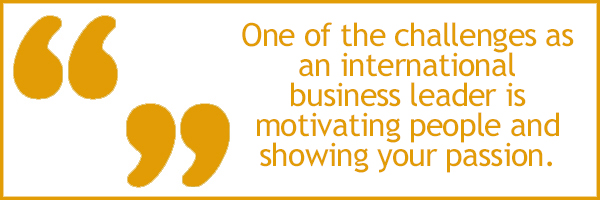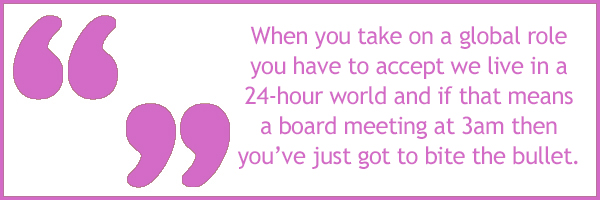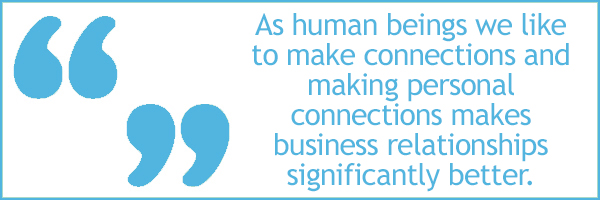Aspermont Limited is a leading international publisher to the mining, construction and oil & gas sector, and as CEO of Events, everywomanClub member Ruth Carter is responsible for running huge international summits and events across the globe. Based in the UK, she heads up teams in London, Hong Kong, Sydney and Melbourne, meaning she welcomes in most new days at the eye-wateringly early time of 4am! Here she shares her priceless advice for making a soaring success of a global business role. Warning: for the squeamish, you may want to read the Never Ask What You’re Eating passage from behind your hands…
 1. Think Globally
1. Think Globally
I liaise with Hong Kong and Australia daily as part of my role at Aspermont Ltd and in my previous job at UBM I had MDs reporting into me from Shaghai, Kuala Lumpa, Mumbai, Amsterdam, Sao Paolo and LA – so let’s just say I’ve never been a 9-5 person. I was up at 4am today. However, in international business, if you turn up for work at 9 o’clock then Asia is just going to bed. If you switch off at 5pm, west coast US hasn’t even got up yet. It’s one of the key challenges of my job, but also what I love about it. Do I like coffee? That’s like asking do I like air.
2. Get used to flying – even if it’s not your first love!
I’m on a plane every three weeks to Hong Kong and Australia and I’m terrified of flying, which is interesting. If I was in control and driving I’d be a lot happier. However, there’s nothing that can’t be solved by a glass of champagne.
3. Avoid colloquialisms with international clients
This is important. When I’m speaking to local colleagues and clients I’m able to throw in idioms but if I do that with my international clients then I’m not taking the audience with me. When I’m speaking to China, for instance, I’m conscious to speak what I call GCSE English – simple and clear. I also make a very big point of never saying “Morning” or “Afternoon”, which is a very English thing to do. Say you’re in Australia and I’m the mothership saying good morning to 
4. Throw yourself in at the deep end
Don’t just read up on a country– go there. In my previous job we were opening an office in Shanghai, so I made myself go for two weeks on my own and set up loads of business meetings with people on all levels. My translator and I went everywhere. At one point, I ended up in a food ingredients factory wearing wellington boots and a white coat, having a conversation in Mandarin. At the end of the trip, I came away thinking “Do I really understand China, now?” The answer was no – no one ever really does unless you’re Chinese or you live there – but I did understand how China does business much better than I did two weeks ago.
5. Learn each country’s rules of engagement
In Britain, we practice the art of interruption rather than conversation. If you’re in a meeting, the challenge is: how can I interrupt the speaker at exactly the right time so it’s not too early, too late, or rude? Some European countries just interrupt anyway. But the further east you go, it’s very different. I remember thinking very early on in my career, “These Chinese guys don’t contribute very much.” Actually, they just don’t interrupt – instead they listen, process and think how they can add value. We Brits can’t deal with a minute of silence, though, so that’s another challenge for me. I find myself physically counting down the seconds until I let myself speak. I still can’t wait any longer than a slow five.
6. If you can, study a new language
I’ve been learning Mandarin for two years and I’m brilliant as long as I’m speaking to someone who doesn’t know any Mandarin. I’ve always been useless at languages so as an English person the greatest gift we’ve been given is the fact that the international business language is English. Saying that, I’ve found learning Mandarin very useful because I understand a lot more than people think I do.
7. Accept, don’t judge, cultural differences 
If someone starts hawking and spitting in a meeting it’s not necessarily unacceptable, rude or wrong. British culture is no different – I remember one of my Asian clients once looking at me in horror when I blew my nose on a hanky and put it back in my handbag. Luckily I knew them well enough to ask, “Go on, what have I done?” He replied, “We find what you just did fascinating. What other bodily excretions would you put in a lovely piece of cloth and store in your handbag?” He’d got a point.
8. Let your international host order your meal for you

9. But never ask what you’re eating
I’ve also eaten some of the most disgusting things known to woman. Three things to spring to mind: two sound worse than the first, but the first was truly the worst. Duck tongue. It’s beyond awful. It has a bone in it and tastes like you’re eating your own tongue. It was presented to me, with great ceremony, in a wheat sheaf of about 20 tongues. And because I was very honoured to receive it, I had to eat it all. The other two things that weren’t as bad as they sound were puppy liver and donkey willy.
10. Act as if you’re face to face, even on video call
When you’re face to face with a person, you have five minutes of chat before getting onto work. However, I’ve found that as soon as we run a video conference we forget that we have to do those few minutes of small talk, the “Great day isn’t it?” “Love your top” talk. So what I do and what I’d advise other people do is: force yourself to pretend you’re face to face and have that small talk so you make those connections. It’s so easy to bypass. I do it almost by law. Every international communication piece needs that personal touch.
everywomanWorld is a popular series focusing on the global perspectives of our Network and Club members’ careers, showcasing female perspectives of all aspects of working across cultures. Do you have an everywomanWorld story you want to share? Send us an email at [email protected].


 1. Think Globally
1. Think Globally






